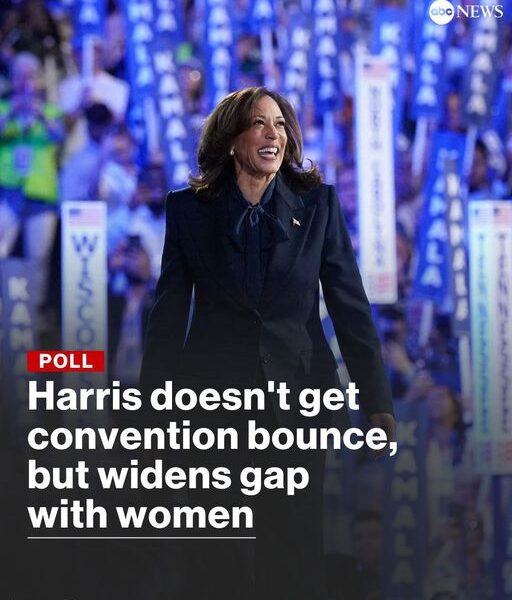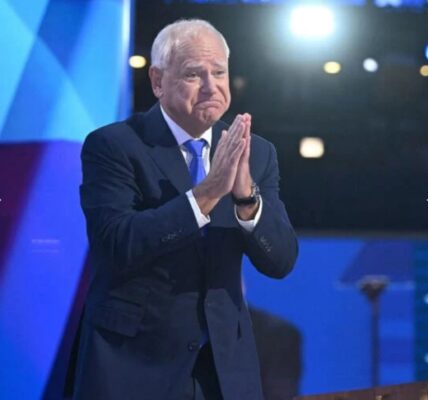Kamala Harris has maintained her advantages over Donald Trump on personal attributes and broadly is seen as running the better presidential campaign in a new ABC News/Ipsos poll, with comparative doubts about Trump’s campaign in his base and the political center alike.
The race between them remains close, with no overall bounce in support for Harris out of her nominating convention, albeit with a wider gender gap. Trump, too, was bounce-free after his convention in July, indicating the locked-in nature of their highly polarized contest as it enters its final two months.

Results show Harris’ competitiveness as a walk-on candidate. Fifty-six percent of Americans in the national survey say she has done an excellent or good job running her campaign, compared with 41% who say the same for Trump. Most, instead, rate Trump’s campaign negatively.
Notably, 93% of Democrats and 56% of independents rate Harris’ campaign positively, as do 24% of Republicans in this poll, produced for ABC by Langer Research Associates with fieldwork by Ipsos. Fewer across groups see Trump’s campaign positively — 79% of Republicans, 38% of independents and 13% of Democrats.
See PDF for full results.

Harris’ supporters are 14 percentage points more apt than Trump’s to be satisfied with the matchup, similar to pre-convention results. And the public by a 6-point margin, 43%-37%, picks Harris to win the ABC News presidential debate on Sept. 10.
Here, too, Harris shows more strength in her base — 86% of Democrats expect her to win the debate, while 79% of Republicans expect Trump to win it. In the political center, independents pick Harris by 7 points.
Harris also leads in the level of angst among her supporters. Seventy-five percent of them say it would be “a crisis” if Trump were elected, a sentiment that could motivate turnout. Fewer Trump supporters, but still 67%, see a Harris win as a crisis.
MORE: Two-thirds of Americans say Trump unprepared to accept the election outcome: POLL
As to running mates, Minnesota Gov. Tim Walz continues to win a warmer welcome than Ohio Sen. JD Vance. Americans divide essentially evenly, 49%-50%, in confidence that Walz would be qualified to take over as president, while 57% aren’t confident that Vance is qualified. And Walz is seen favorably by 42%-31%, while Vance is underwater in favorability, 32%-44%. About a quarter are unready to express an opinion of either.
At the same time, Trump continues to lead on the top concerns in the race, trust to handle the economy in general and inflation in particular, both by 8 points, and by 9 points on the immigration situation at the U.S.-Mexico border, albeit a lower-rated issue in importance in previous data. Trump also benefits from the fact that 46% call Harris too liberal — though, on the other hand, 43% call him too conservative.
The race
All in all, the horse race is essentially the same now as it was before the Democratic convention — 50%-46%, Harris-Trump, among all adults and registered voters alike, and 52%-46% among likely voters. That’s a slight Harris lead in the first case and a full lead among likely voters. (Results exclude those who say they wouldn’t vote.)

While the overall numbers are essentially unchanged from before the convention, the gender gap has widened. Harris leads by 13 points among women, 54%-41%, while it’s Trump +5 points among men, 51%-46%, for an 18-point gap. (The Trump-Harris difference among men is not statistically significant.) Pre-convention, Harris had been a slight +6 points among women and a non-significant +3 among men, a 3-point gap. The gender gap now is more in line with recent elections — an average of 19 points in exit polls since 1996.
Much of the moves among women and men have occurred among white people. White women have gone from +13 points for Trump pre-convention to a virtual dead heat (Trump +2) now; white men, from +13 points for Trump before the convention to +21 points now.

With Robert F. Kennedy Jr. suspending his campaign and backing Trump, the poll finds similar results when the remaining independent and minor-party candidates are included: overall, another slight +4 points for Harris among all adults (49%-45%) and +5 points among both registered voters (50%-45%) and likely voters (51%-46%).
Any help for Trump from Kennedy is scant. Seventy-nine percent overall say Kennedy’s support makes no difference in their choice. Twelve percent say it makes them more likely to support Trump — but nearly all who say so are Republicans and GOP-leaning independents, so apt to be Trump supporters in the first place. Nine percent overall — nearly all Democrats and Democratic leaners — say Kennedy’s endorsement leaves them less likely to support Trump.
In terms of intensity, 64% of Harris’ supporters back her strongly; one of the few measures to shift, this is up slightly from 60% before the convention. Sixty percent of Trump’s support is strong, unchanged. For comparison, President Joe Biden, in July, had just 34% strong support.
Most vote preferences look locked in. Among Americans who don’t currently support Harris, 86% rule out doing so, and among people who don’t currently support Trump, 89% wouldn’t consider him. Among likely voters, these rise to 96% and 97%, respectively. As such, getting out the vote likely will be more fruitful than trying to change people’s minds.

